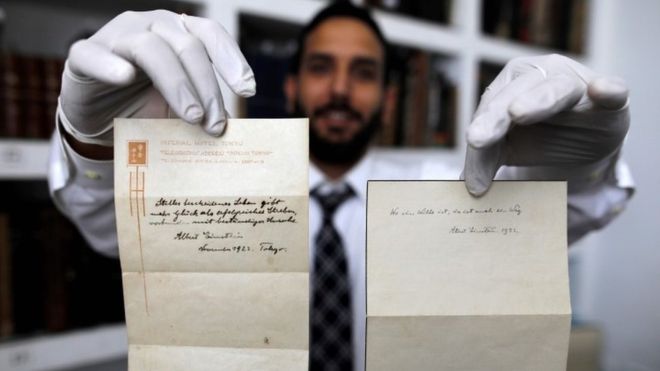
The Nobel Prize-winning German-born physicist gave the notes to a courier in Tokyo in 1922 .
1922年,诺贝尔奖得主、出生于德国的物理学家(爱因斯坦)在东京将一份笔记交给了一名快递员。
He told the messenger that if he was lucky, the notes would become valuable.
他告诉这位信使,如果他足够幸运,这份笔记将价值连城。
Einstein devoted his life to science but suggested in the notes that achieving a long-dreamt-of goal did not necessarily guarantee happiness.
爱因斯坦将自己的毕生奉献给了科学,但是笔记上的建议称,实现长期梦想的目标并不能绝对保证幸福。
When the courier came to his room to make a delivery, the physicist did not have any money to reward him.
当快递员到他房间交货时,他没有奖赏他一分钱。
He had at the time just heard that he had won the Nobel Prize for physics and was in Japan on a lecture tour.
当时,快递员刚刚听说爱因斯坦获得了诺贝尔物理学奖,在日本进行演说。
Instead, he handed the messenger a signed note - using stationery of the Imperial Hotel Tokyo - with one sentence, written in German: "A calm and humble life will bring more happiness than the pursuit of success and the constant restlessness that comes with it."
取而代之地是,他把一份用东京帝国酒店信纸书写的签名笔记交给了信使——上面用德语写着一句话:“比起追逐成功和与之而来的持续不安,平静并且质朴的生活将会带来更多幸福。”
A second note written at the same time simply reads: "Where there’s a will, there’s a way." It sold for $240,000, Winner’s auction house said.
第二份同时书写的笔记只有寥寥数语:“有志者事竟成。”Winner拍卖行表示,这句话售价24万美金。
The winning bids for both notes were far higher than the pre-auction estimated price, the auctioneers said.
拍卖人表示,两份笔记的中标价都远高于拍卖前的估价。
It said the buyer of one of the notes was a European who wished to remain anonymous.
据说,其中一份笔记的购买者是一位希望保持匿名的欧洲人。
The seller is reported to be the nephew of the messenger.
据报道,售卖者是信使的侄子。







